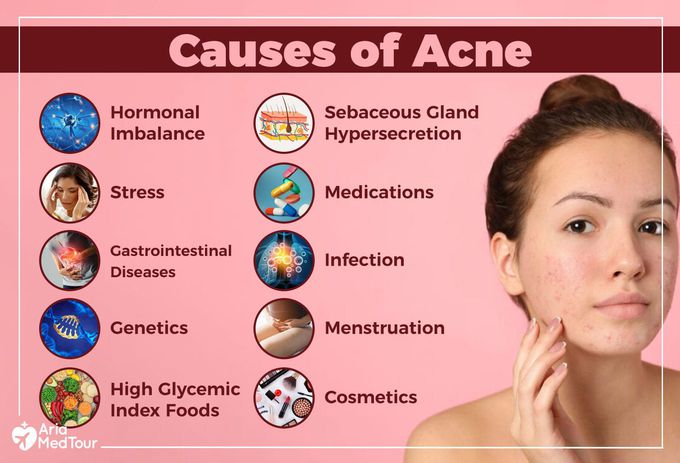


Causes of Acne
Acne is a skin condition that occurs when hair follicles become clogged with oil and dead skin cells. This clogging leads to the formation of pimples, whiteheads, blackheads, and other lesions. The causes of acne are complex and involve a combination of factors, including hormonal changes, genetics, and bacteria. Key factors that contribute to acne: Hormonal changes: Hormones, especially during puberty, can stimulate oil production (sebum) in the skin's oil glands. This excess oil can then mix with dead skin cells and clog pores. Excess oil production: Sebaceous glands, which are attached to hair follicles, produce sebum, an oily substance that lubricates the skin and hair. In some individuals, these glands become overly active and produce more sebum than necessary, contributing to pore blockage. Dead skin cell buildup: The skin constantly sheds dead skin cells, which can also contribute to pore clogging. Bacteria: A type of bacteria called Cutibacterium acnes (formerly known as Propionibacterium acnes) can thrive in the clogged pores, leading to inflammation and the development of pimples, pustules, and cysts. Genetics: Some individuals are genetically predisposed to acne, meaning they have a higher chance of developing the condition. Medications: Certain medications, such as steroids and some antidepressants, can also trigger or worsen acne. Stress: Stress can release hormones that increase oil production and exacerbate acne. Acne - Causes - NHS Acne is caused when tiny holes in the skin, known as hair follicles, become blocked. Sebaceous glands are tiny glands found near t... NHS Acne - Symptoms and causes - Mayo Clinic 20 Jul 2024 — How acne develops. Acne develops when sebum — an oily substance that lubricates your hair and skin — and dead skin cell... Mayo Clinic Acne Vulgaris - StatPearls - NCBI Bookshelf Continuing Education Activity. Acne vulgaris is a chronic inflammatory disorder affecting the pilosebaceous unit, typically follow... NCBI Show all This is for informational purposes only. For medical advice or diagnosis, consult a professional. AI responses may include mistakes.


